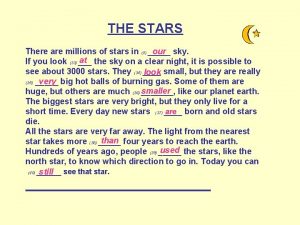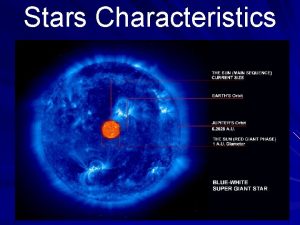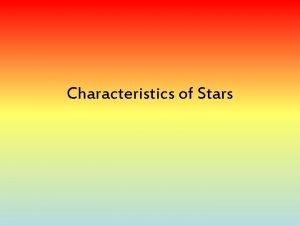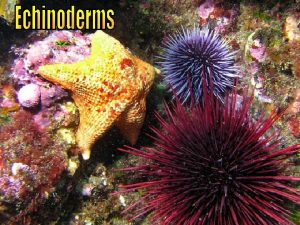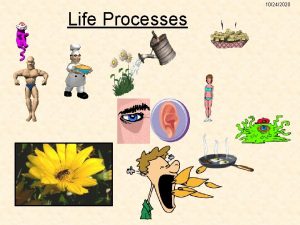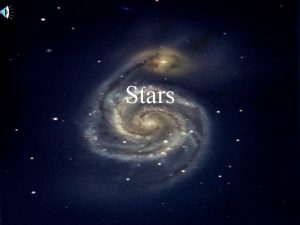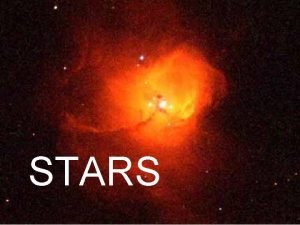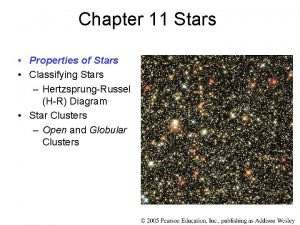Stars Characteristics 10242020 What are the characteristics of














- Slides: 14

Stars Characteristics 10/24/2020

What are the characteristics of a star? Stars differ in… Mass Size Temperature Color Luminosity

Mass and Composition A star is a massive ball of gases, mainly hydrogen and helium. Bigger stars have more mass, greater gravity and are hotter than smaller stars.

Star Size Large Stars: Giants or Super Giants Medium Stars: Main Sequence (the Sun) Small Stars: White Dwarf or Neutron 10/24/2020

10/24/2020

Star Energy The enormous pressure and heat in a star’s core converts matter into energy. This reaction is called nuclear fusion In nuclear fusion, hydrogen atoms fuse to form helium atoms. During each step of the process, mass is lost and energy is released.

Star Energy cont. The energy released causes the star (Sun) to shine and gives the star its high temperature. 10/24/2020

Star Temperature Stars in the sky show tinges of different colors which reveal the stars’ temperatures. Blue: hottest Yellow: medium temperature Red: coolest 10/24/2020

Classification of Stars Spectral Class Color Surface temp (ºC) Examples Blue Above 30, 000 10 Lacertae O Blue-white 10, 000 – 30, 000 Rigel, Spica B White 7, 500 – 10, 000 Vegas, Sirius A Canopus, Procyon F Yellow-white 6, 000 – 7, 500 Yellow 5, 000 – 6, 000 Sun, Capella G Orange 3, 500 – 5, 000 Arcturus, K Aldebaran Red 10/24/2020 Less than 3, 500 Betelgeuse, Antares M

Star Luminosity/Brightness The brightness of a star depends upon the distance and its luminosity. Apparent Brightness/Magnitude: a star’s brightness as seen from Earth. Absolute Brightness/Luminosity: the actual brightness 10/24/2020

Stop and Think If person A has a pen flashlight and person B has a mega flashlight and both were standing at the front of the classroom, which light would appear brighter? If person A (pen light) stood in the classroom and person B (mega light) stood at the baseball fields across the street, which light would appear brighter? You cannot tell by looking in the sky how bright a star truly is. The farther away the star is, the less bright it will appear. 10/24/2020

The Hertzsprung-Russell Diagram An H-R diagram plots stars according to their luminosity and temperature. 10/24/2020

Location of Stars on an H-R Diagram 10/24/2020

Star Mass Position on H-R depends on mass The larger the amount of mass in a star, the more luminous it is. Giants: more mass, more luminous Dwarfs: less mass, less luminous During its lifetime a star will evolve on the H-R diagram depending on its mass. 10/24/2020
 Mikael ferm
Mikael ferm There are millions of stars in space
There are millions of stars in space Characteristics of stars diagram
Characteristics of stars diagram Characteristics of stars diagram
Characteristics of stars diagram What characteristics are used to classify stars?
What characteristics are used to classify stars? Rumus magnitudo bintang
Rumus magnitudo bintang Brittle stars characteristics
Brittle stars characteristics Characteristics of stars
Characteristics of stars Hình ảnh bộ gõ cơ thể búng tay
Hình ảnh bộ gõ cơ thể búng tay Frameset trong html5
Frameset trong html5 Bổ thể
Bổ thể Tỉ lệ cơ thể trẻ em
Tỉ lệ cơ thể trẻ em Voi kéo gỗ như thế nào
Voi kéo gỗ như thế nào Glasgow thang điểm
Glasgow thang điểm Chúa yêu trần thế alleluia
Chúa yêu trần thế alleluia

